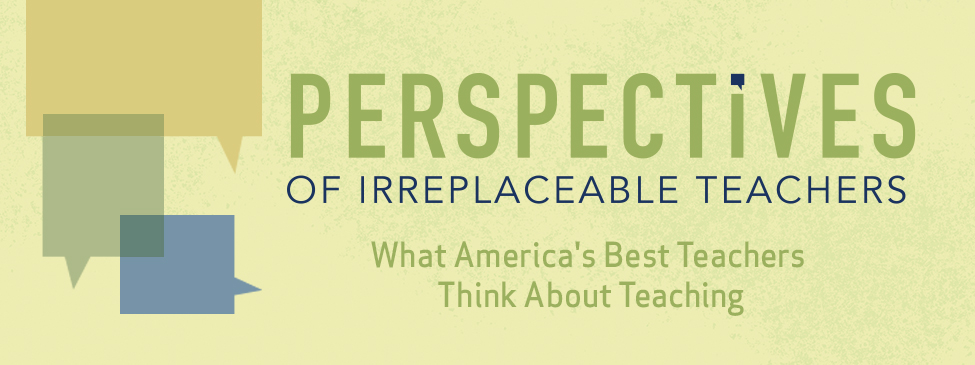When we published The Irreplaceables, our 2012 study of teacher retention in urban schools, we were shocked that two-thirds of the highest-performing teachers we surveyed had not even been encouraged to stay at their school. It seemed to encapsulate the incredible extent to which top teachers were taken for granted.
It’s clear that we all need to pay a lot more attention to our nation’s best teachers if we want to improve schools and give the teaching profession the respect it deserves. But how? One way is to give great teachers a platform, as we’ve tried to do with the Fishman Prize. Another is to listen much more carefully to their ideas and opinions.
That’s what we did for our new report, Perspectives of Irreplaceable Teachers. It’s based on a survey of 117 of America’s best teachers working in high-poverty schools—the first of its kind, to the best of our knowledge.
In inviting teachers to participate, we defined “irreplaceable teacher” expansively and relied on the judgment of others more than our own. We started with teachers who had recently won elite teaching awards, from Milken Educator Awards and our own Fishman Prize to the NEA Foundation’s Awards for Teaching Excellence. We also sought out those recognized by leading education organizations, from groups like Teach Plus and the National Board for Professional Teaching Standards to the country’s most acclaimed charter school networks.
Our goal was not to generate a scientifically representative sample but to listen to each of these teachers’ voices carefully and represent their views as faithfully as possible. We asked them about everything from how they spend their time during a normal workday to what they think about the major policy issues facing their schools.
Our report focuses on three major themes we saw in their responses:
- When it comes to measuring success in the classroom, they value a wide array of factors. Our respondents judge their success in many different ways, from their students’ academic performance and future success to feedback from their school leaders, respected colleagues and students.
- They attribute little of their success to formal preparation or professional development programs. When asked to rank activities that had improved the quality of their teaching, our respondents put their preparation programs and formal professional development at the very bottom of the list.
- They have a troubling love/hate relationship with their profession. Our respondents cherish the opportunity to make a difference in their students’ lives. But they feel beaten down by many other aspects of the profession, like low pay, excessive bureaucracy and ineffective leaders and colleagues. About 60 percent plan to stop teaching within five years as a result.
More than anything else, we were struck by the complex and sometimes contradictory nature of their responses. Given the diversity they represent in terms of geography, experience, subject area and school types, that’s no surprise. But it’s an important reminder that excellent teachers think for themselves, and that any attempts to paint their views with a broad brush are likely inaccurate.
Rather than definitively answering any individual policy question, our hope is that Perspectives of Irreplaceable Teachers opens up a broader dialogue. In the coming weeks, we’ll delve more deeply into interesting facets of their responses, such as how the views of the charter school teachers in our sample differ from those of their colleagues at traditional public schools.
We also want to hear directly from teachers. In what ways do you feel teachers’ views tend to be oversimplified? What about the major themes we discuss in the report do you agree or disagree with? Tell us, and we’ll post the most insightful responses here.


